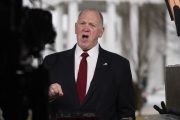
The women and the attorneys who lodged explosive allegations of sex crimes against U.S. Supreme Court nominee Brett Kavanaugh did little to nothing to help the Senate Judiciary Committee investigate their claims.
That’s just one disturbing revelation in the committee’s summary of its work on the allegations. Ford accused Kavanaugh of attempted rape at a party in 1982. Ramirez said he exposed himself to her when they were in college.. And Swetnick spun a phantasmagoric tale of gang rape in high school.
Yet all steadfastly refused, through their attorneys, to offer much if any help, even turning down interviews with committee staff.
Like the FBI probe, the committee’s investigation found nothing to corroborate the accusations, which surfaced, conveniently, after it became clear Kavanaugh was likely headed for the court.
The FBI report landed on the Senate Judiciary Committee’s site today as the full Senate voted to end debate on Kavanaugh’s nomination, 51-49, sending the matter to a confirmation vote tomorrow.
But the report and committee review of its work aren’t the only exculpatory evidence. Kavanaugh’s high-school classmates verified his testimony of September 27 that “Devil’s Triangle” was indeed a drinking game and not a reference to a ménage à trois.
Report Finds Nothing, Committee Details Work
The synopsis of the FBI report explains that “the FBI reached out to all witnesses with potential firsthand knowledge of the allegations” from Ford and Ramirez. The result was this: “The Supplemental Background Investigation confirms what the Senate Judiciary Committee concluded after its investigation: there is no corroboration of the allegations made by Dr. Ford or Ms. Ramirez.”
Importantly, however, the committee offered a detailed account of its work. Despite collecting “statements, letters, and calls from individuals around the country,” and conversations with 35 individuals, the committee “has not received any evidence that would corroborate the claims.”
Because Ford’s attorneys refused to permit the committee to interview Ford, and she didn’t, apparently, know staff members would fly anywhere to get her testimony, the committee reopened the hearing.
The committee heard from Ford and Kavanaugh for eight hours on September 27. It also collected 24 pages of evidence from Ford and received Kavanaugh’s calendars from 1982.
As well, “the Committee also received a statement, submitted under penalty of felony, from Dr. Ford’s ex-boyfriend, who cast serious doubt” on Ford’s testimony. He stated that he never heard Ford say she is afraid to fly, contrary to her sworn testimony, and that she had offered a friend advice on taking a polygraph exam, again contrary to her sworn testimony.
The summary noted, as has committee Chairman Chuck Grassley (shown), that Ford’s attorneys steadfastly refused to turn over “several key items, including the charts from her polygraph examination, any recording of her polygraph examination, and the therapy notes that she claimed corroborated her story.”
Yet Ford “shared these same notes with the media.”
The committee also received statements from the “three individuals” Ford said were at the party in 1982: PJ Smyth, Leland Ingham Keyser, and Mark Judge. All “denied having any knowledge of the alleged gathering. Ms. Keyser stated that she does not even know Judge Kavanaugh and does not recall ever meeting him.” Smyth and Judge said they never saw Kavanaugh behave as described.
“The Committee contacted Ms. Ramirez’s counsel 7 times seeking evidence to support the claims made in The New Yorker,” the summary said. “Ms. Ramirez produced nothing in response.” Her attorney refused the committee’s request to interview Ramirez. Thus, the committee could not verify Ramirez’s claims.
Six times the committee asked for evidence from Swetnick, whose credibility was dubious from the start. She refused an interview. So the committee interviewed 12 witnesses, none of whom, apparently, corroborated her lurid tale of incapacitating girls with drugs and booze to gang rape them.
Thus, the committee probe, “like the FBI supplemental background investigation, has found that there is no corroboration of the allegations.”
Devil’s Triangle
Meanwhile, CNN’s Jake Tapper posted two letters from six of Kavanaugh’s high-school classmates. They wrote that Kavanaugh told the truth in testifying that “Devil’s Triangle” was a drinking game, not a reference to three-way sex.
“Devil’s Triangle was a drinking game we came up with in high school,” the letter says, describing how it was played. “None of us used the phrase ‘Devil’s Triangle in our yearbook to refer to any kind of sexual activity.” The other said likewise, noting that “it was simply a game that used cups or glasses of beer placed in the shape of a triangle.”
Photo: AP Images




